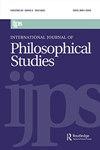Could There Be Expressive Reasons? A Sketch of A Theory
IF 0.6
3区 哲学
0 PHILOSOPHY
INTERNATIONAL JOURNAL OF PHILOSOPHICAL STUDIES
Pub Date : 2022-05-27
DOI:10.1080/09672559.2022.2121891
引用次数: 1
Abstract
ABSTRACT In pursuit of a theory of expressive reasons, I focus on the practical rationality of actions such as welcoming, thanking, congratulating, saluting – I label them ‘expressive actions.’ How should we understand the kinds of practical reasons that count in favour of expressive actions? This question is related to the question of how to understand non-instrumental fittingness-type reasons for emotion. Expressive actions often are and should be expressions of emotion. It seems to be an important feature of such actions that the reasons that count in favour of the action are entangled with reasons of fittingness that count in favour of the relevantly connected emotion. But how should we understand this entanglement? I argue that the relevant category of reasons cannot be captured on approaches standard in normative theory. I develop a theory of sui generis expressive reasons. I argue that we have reason to perform actions that mark certain situations that contain some significant value or disvalue, independently of any reason to alter those situations. This is the role of expressive actions. Sui generis reasons for expressive actions are entangled with reasons for relevantly connected emotions because (some) emotions have the same role of marking extraordinary situations.会有表达的原因吗?一个理论的草图
摘要在追求表达原因理论的过程中,我关注欢迎、感谢、祝贺、敬礼等行为的实践合理性——我将其称为“表达行为”我们应该如何理解有利于表达行动的各种实际原因?这个问题与如何理解非工具性契合型情感原因的问题有关。表达行为通常是而且应该是情感的表达。这类行动的一个重要特征似乎是,有利于行动的原因与有利于相关情感的适合性原因纠缠在一起。但我们应该如何理解这种纠缠?我认为,相关的原因类别不能在规范理论中的方法标准上得到体现。我发展了一个关于独特表达原因的理论。我认为,我们有理由采取行动来标记某些情况,这些情况包含一些重大价值或不价值,而不需要任何改变这些情况的理由。这就是表达行为的作用。表达行为的一般原因与相关情感的原因纠缠在一起,因为(一些)情感在标记特殊情况方面具有相同的作用。
本文章由计算机程序翻译,如有差异,请以英文原文为准。
求助全文
约1分钟内获得全文
求助全文
来源期刊

INTERNATIONAL JOURNAL OF PHILOSOPHICAL STUDIES
PHILOSOPHY-
CiteScore
0.90
自引率
0.00%
发文量
29
期刊介绍:
The International Journal of Philosophical Studies (IJPS) publishes academic articles of the highest quality from both analytic and continental traditions and provides a forum for publishing on a broader range of issues than is currently available in philosophical journals. IJPS also publishes annual special issues devoted to key thematic areas or to critical engagements with contemporary philosophers of note. Through its Discussion section, it provides a lively forum for exchange of ideas and encourages dialogue and mutual comprehension across all philosophical traditions. The journal also contains an extensive book review section, including occasional book symposia. It also provides Critical Notices which review major books or themes in depth.
 求助内容:
求助内容: 应助结果提醒方式:
应助结果提醒方式:


